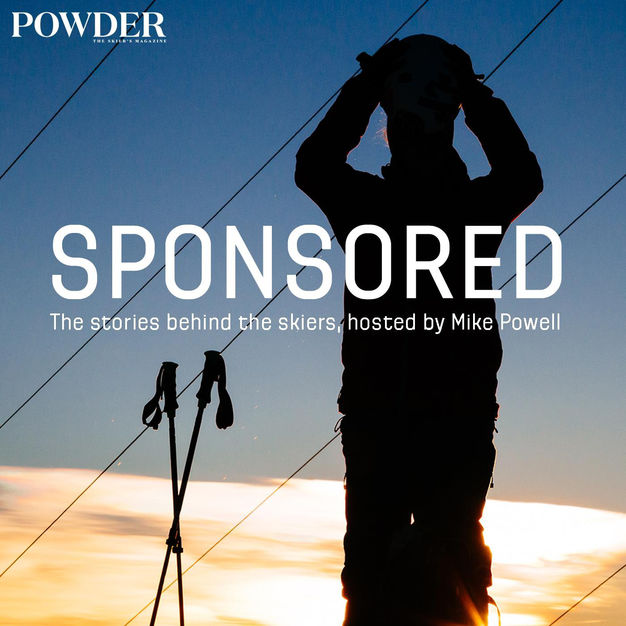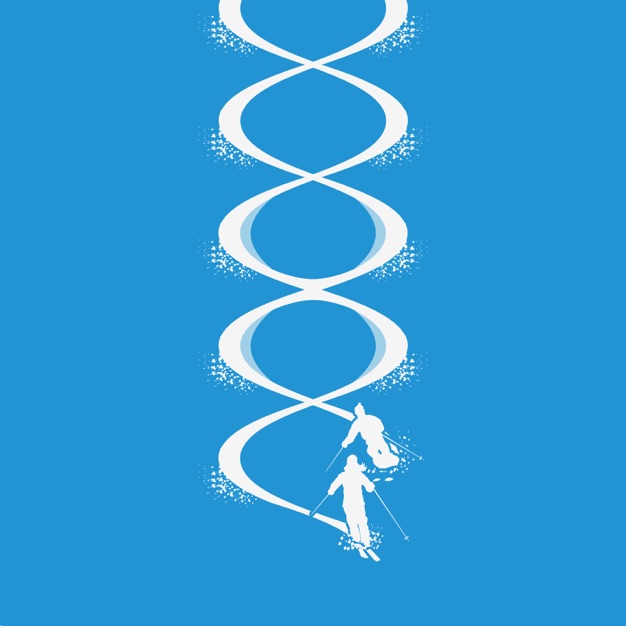
Sponsored: The stories behind the skiers
Powder Radio
Sponsored is a weekly show hosted by Mike Powell that goes deep into the lives and stories of professional skiers. Each show will include an interview with a different skier, and discuss how they moved up the ranks from amateur to professional, and where
- 30 minutes 7 secondsSponsored, Episode 34: Rory Silva
On this week's episode of the "Sponsored" podcast, the last of season one, host Mike Powell interviews Rory Silva. If you've been regularly listening to "Sponsored," Silva's name is one that has frequently come up. He was among the top echelon of skiers before a lack of business skills caught up with him. The type 1 diabetic and Mammoth native is now living in Southern Oregon, where he was fulfilling DUI obligations.
Show Notes: 2:30: The trials and tribulations of getting a DUI 5:45: Health choices and Diabetes 7:30: Growing up and having Plake around 11:00: Rory and school 12:30: Getting sponsored, how does that happen? 15:00: Superpark, being a professional skier, and movie parts 20:00: Ninthward 24:00: The end of making money in skiing for Rory and what is he up to now? 27:50: Deadabetic ski edits
10 May 2017, 7:01 am - 38 minutes 56 secondsSponsored, Episode 33: Marc-Andre Belliveau
On this week's episode of the "Sponsored" podcast, host Mike Powell interviews French Canadian Marc-Andre Belliveau. In 2006, Belliveau was one of the top skiers in the world. He was featured regularly in Teton Gravity Research films for his progressive style. His sister, too, was an Olympic hopeful. One day they were skiing together and she broke her back.
"I felt really responsible for my sister when she got hurt," he says. "I remember the phone call to my dad to tell him that she was all fucked up. And his reaction was feeling that I was responsible for her accident because we were doing crazy shit. I got really bummed out. I started to feel really shaky about skiing. I actually thought I wasn't going to ski anymore. But she was the first one telling me, 'Yeah, it was bad luck. You don't want to quit skiing just because I got hurt."
Belliveau continued skiing. Then, in 2006, he lost his way on the last day of a trip while filming for TGR and broke his T12 vertebra. He has been paralyzed since.
"I felt ashamed that I kept going skiing," he says. "It's a dangerous sport. You feel selfish. The things you do can hurt other people. When I got hurt, it really hurt my friends, my parents, and yeah, the word that comes to mind is just being selfish."
After Belliveau's injury, a number of high-profile skiers died while skiing, including 10 people that he knew. Belliveau says he has always had a hard time making the right choice.
"I'm not bummed out that I chose skiing as a way of life. But I'm very bummed that I skied that run," say Belliveau, who recently gave up drinking and smoking. "I've had a hard time... I've been struggling a lot the last ten years."
3 May 2017, 7:01 am - 31 minutes 6 secondsSponsored, Episode 32: Mike Hattrup
Mike Hattrup Show Notes 1:30: What is Hatt up to and how has his season been 2:45: Getting a knee replacement 3:40: Growing up Hattrup, sports and getting into skiing 8:00: Filming with Stump and making the US Ski Team 10:00: Blowing his knee for the first time 13:00: Blizzard of Ahhs 15:30: Plake’s legal problems 18:00: How did the movie change his life 20:00: Working in house at K2 22:00: Developing skis and working with Shane McConkey 27:00: Questions from Stump
25 April 2017, 7:04 am - 35 minutes 15 secondsSponsored, Episode 30: Matt Margetts
On this episode of the "Sponsored" podcast, Canadian Olympian Matt Margetts joins host Mike Powell. After years pursuing halfpipe competitions, Margetts has joined childhood friends including Riley Leboe, Joe Schuster, and Mike Henitiuk in filming "Seeking Nirvana." The award winning video series—last year it won Best Editing at the 2016 Powder Awards—is a whimsical tribute to creative filming and fun, stylish powder skiing.
Transitioning from the stunt ditch to fields of powder has been welcome change to Margetts, who often had a hard time meeting his own expectations in the finals of big events.
"I have an issue with things not working out or not going my way," he says. "If it's something as simple as not doing a run that I wanted to do that I know I can do or falling when I know that I can land I just snap and get super bummed on myself. I was one of those guys that could pull it off in practice or pull it off in qualifiers and then try and go balls to the wall in finals and shit would hit the fan. I couldn't quite figure it out... that was the hard part about it. I worked with a few different people and just couldn't get the answers I was looking for. I couldn't get a solution."
For Margetts though, as his career turns away from competition and back toward where it started, nothing beats skiing powder with his friends—even if there is less money in it.
"My whole ski career, if you can call it that, has been on the dirt bag side of things, trying to slum it to make ends meet here and there so I can keep doing it, but I love it, and I want to be able to continue to do it for as long as I can," he says. "It's pretty damn fun."
19 April 2017, 7:01 am - 41 minutes 31 secondsSponsored, Episode 30: Kim Reichhelm
On this episode of the "Sponsored" podcast, Kim Reichhelm, one of the original badasses of freesking, joins host Mike Powell. Reicchelm is candid about her upbringing with a stern father and her current rock and roll lifestyle. The veteran ski racer, commentator, two-time World Extreme Ski Champion, and the figurehead of the highly successful "Ski With Kim" camps, Reichhelm discusses how she was made fun of at school, but found herself through sports.
"All of my confidence came from sports because I was a horrible student," she says. "I was dyslexic, I had difficulty reading, I really, really struggled in the classroom and the playground was where all my confidence came from. I was respected."
Reichhelm was also one of the first skiers to turn herself into a successful brand, and she talks about how she had to choose between ski racing and having fun. For her, the choice was easy.
"I had to say I'm either going to win the tour, or I'm going to quit. I wanted to win, and then I realized that in order to win the tour I was going to have to drink less beer and focus on ski racing and not traveling around to Miami Beach between ski races, so I decided to stop racing."
For Reichhelm, who always followed her heart, it couldn't have worked out better.
12 April 2017, 7:01 am - 29 minutes 41 secondsSponsored, Episode 29: Colston Vb
On this episode of the "Sponsored" podcast, Colston VB talks to host Mike Powell about the struggle to make it as a professional skier. The two discuss Vb's role on Bravo's reality TV show, Timber Creek Lodge, which he was conflicted about appearing on.
"Within skiing I really focused on not selling out," he says. "I really focused on staying super core and not doing the cheesy Instagram stuff and not compromising myself and I wanted to be talent first. A part of it was funny and part of it was to take a break and enjoy it. I'm really happy I did it."
2:00: Growing up in Rossland, BC, in a ski bum home 6:00: Colston's career 9:55: Overcoming money issues and living life to its fullest 11:30: Sponsors and Jeff Schmuck helping him out 12:55: Being a professional, getting an agent, and learning lessons 16:10: The biggest moments of his ski career 18:25: How did he get into reality TV? Does it kill skiing?
22:30: Being semi-famous in a digital world 23:45: Questions from fans of the show 26:00: Money in reality TV and what’s next in skiing, TV, and life5 April 2017, 1:34 pm - 31 minutes 36 secondsSponsored, Episode 28: Pep Fujas
On this episode of the "Sponsored" podcast, Pep Fujas, one of the most influential skiers of the 21st century, joins host Mike Powell. Known for his seminal segment in Session 1242, his role in Nimbus films, and his successful pro models, Fujas, who grew up in a yurt in Oregon without electricity or a phone, is also the father of two young daughters. The two discuss balancing fatherhood and travel and Fujas' influence on skiing, including the pole-less style he helped lead.
"Sometimes we'd drop the poles and you just get to experience a different way to move on the mountain," says Fujas. "Your hands are free, you can feel free to brush the snow, and since you're not thinking about having the poles in your hand, you can move in a lot of different ways and it starts to refine your movements, starts to quiet everything down, because if you have really erratic hand movements, it just looks terrible, and it's really hard to make skiing look without poles look really good. So I think it was just another way to express yourself on skis and it was really fun and we didn't really care what anybody thought."
1:51: Recap his season travels as a father of two children under 2 years old 4:15: Life has totally changed for Pep in the past three years 6:22: Growing up in Oregon, in a yurt 10:30: How did he get into skiing and what else is going on in life? 14:55: Boarding school, moguls, and competition 17:20: What skiers did Pep look up to? 18:35: How did the sponsors find him? 21:12: Pro models and the money he made 23:22: How did Nimbus come together and what did that entail? 25:31: Dropping his poles, HellBents in the X Games 28:35: What is the focus of his ski career these days and getting dropped by Oakley
29 March 2017, 7:31 am - 41 minutes 37 secondsSponsored, Episode 27: Julian Carr
"It's hyper awareness. I am like charged particles, and I'm sharing with my surroundings, like part of this rich, interconnected web," he says about his airs. "There is no empty space. So the moment I leave a cliff I'm connected through the air, the trees, the ground, my skis, the wind, and when I land, it's a seamless integration, because I actually never left any connection to that energy level that I'm vibrating with."
:55: The 100 footer Julian posted on Insta and the thought process behind hitting big cliffs 3:10: Growing up in SLC and skateboarding 8:10: Getting into skiing in the 8th grade and team sports 10:30: University of Utah 13:15: His big picture vision 15:50: What he thinks about the folks who say he doesn’t stomp his landings 22:15: The process behind launching Air Jordan as a single hit 26:45: Meeting Jamie Pierre 31:40: Do the records mean anything to him? 33:30: The founding of Discrete Headwear
22 March 2017, 7:01 am - 28 minutes 11 secondsSponsored, Episode 26: Drew Tabke
On this episode of the "Sponsored" podcast, host Mike Powell interviews perennial Freeride World Tour contender and former champion Drew Tabke. Tabke is one of the most outspoken athletes on the tour, and the two discuss how to grow the exposure of what is skiing's most exciting competition and why Tabke returns year after year.
"I really do believe in what we're doing," says Tabke. "Sometimes it's epic and sometimes it's not, but it's almost always worthwhile."
1:00: How has your season been so far? 2:30: The early years in Hawaii 4:20: Moving back to Park City 5:30: Skiing in High School 10:00: College and competing 11:15: Life on the Freeride World Tour 18:00: What needs to change on the FWT? 21:15: How has his approach to safety changed in the past decade? 24:00: What has kept him on the FWT instead of filming? 26:30: FWT reality show is the future
15 March 2017, 8:00 am - 25 minutes 42 secondsSponsored, Episode 25: Kristi Leskinen
2:43 Life in Arizona 3:44: Growing up in Pennsylvania wakeboarding and skiing 6:00: The end of team sports 8:32: Killington Mountain School 9:12: Skiing, wakeboarding, and the US Open 12:29: The early challenges for women in the beginning of the modern twin tip era 15:55: The photo shoots that had nothing to do with skiing 18:48: Was she able to make a lot of money skiing? 19:37: Head injuries led to retirement 21:42: ABC’s Superstars and winning it 23:26: The controversy she started with the E-Sports world
8 March 2017, 6:10 pm - 31 minutes 42 secondsSponsored, Episode 24: Skogen Sprang
This week on the "Sponsored" podcast, freeskiing legend Skogen Sprang stops by to talk with host by Mike Powell about his career as a competition and film skier, his style and versatility.
"I did look at it as you should be able to ski every aspect of freeskiing," says Sprang. "You should be good at all these things. And I just enjoyed it, too. For me, always the big mountain and powder and backcountry stuff has been the pinnacle goal of being in the mountains, enjoying it, creating cool looking shots, or images, really just being out there and enjoying the mountains and the soul aspect of that, but then I equally love being out in urban areas and getting creative with some setup and getting technical and playing around in the streets, sliding metal. That's equally as fun just in a totally different way."
1:47: Moved to Park City for the U.S. Team 3:08: Growing up with two brothers and how he got into skiing? 5:26: Switching to snowboarding 7:49: Moving to Tahoe to become a pro snowboarder 10:40: How did he get on Line Skis and what were things line in the late 90s? 17:22: The style of his skiing and skiing everything 20:27: Competition mindset 22:19: The highlights of filming 24:22: The injury 26:53: Starting a valet business 28:43: Head Coach, U.S. Slopestyle Team
22 February 2017, 10:44 pm - More Episodes? Get the App
Your feedback is valuable to us. Should you encounter any bugs, glitches, lack of functionality or other problems, please email us on [email protected] or join Moon.FM Telegram Group where you can talk directly to the dev team who are happy to answer any queries.
 BLISTER Podcast
BLISTER Podcast
 Powder 8 Podcast
Powder 8 Podcast
 Low Pressure Podcast: The Podcast for Skiers
Low Pressure Podcast: The Podcast for Skiers
 Totally Deep Backcountry Skiing Podcast
Totally Deep Backcountry Skiing Podcast